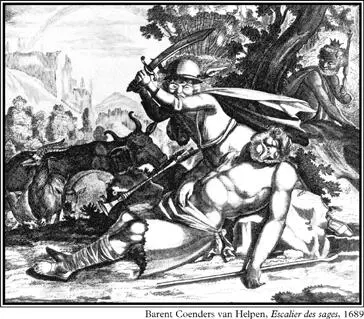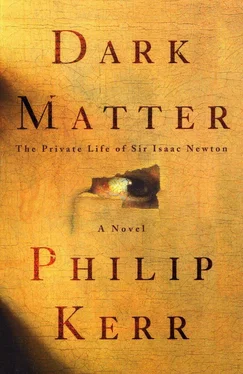My heart full of trouble, I went to the Mint office at around eight o’clock and occupied myself with filing away witness statements in the other cases we still had to deal with; until Doctor Newton came and immediately began to talk about his night’s work with the cipher, for it appeared he had not gone to bed at all. But all the time he spoke, my mind was yet at disquiet that I could not be informed how I stood with Miss Barton and if the morning still found her much offended with me.
“I have a solution,” he said, with reference to the cipher. “Of sorts.”
AND THERE CAME IN ME FEAR WITH JOY, FOR I SAW A NEW LIGHT GREATER THAN THE LIGHT OF DAY.
(THE APOCALYPSE OF PETER)

Barent Coenders van Helpen, Escalier des sages , 1689
I was too upset about what had passed between myself and Miss Barton to be much interested in Newton’s solution to the cipher; and yet I feigned some attention while, with much animation, he spoke of it; so that if there was one thing I understood most clearly, it was that Miss Barton had not spoken to her uncle of our disagreement; and since she had avoided mentioning it, quickly I resolved to do the same, although it had occasioned the greatest sorrow to me that I ever knew in this world.
“My hypothesis upon this cipher has been pressed with many difficulties,” explained Newton. He sat by the table with his papers spread out, and Melchior the cat upon his lap. “As a blind man has no idea of colours, so had I no idea of the manner by which this cipher worked. I still do not. I confess the key eludes me even yet. But what I think I understand now is how the cipher is related to the murders that were done. That I did not perceive this earlier now seems to me so great an absurdity that I begin to wonder what this employment within the Mint has done to my mind. For I believe no man who has any competent faculty of thinking about philosophical matters should ever fall into such an error.
“Because you, my dear fellow, always desire simplicity in things, I’ll explain myself with what brevity I can. Three murders have been accompanied by written ciphers. I have worked upon these with such diligence, you would have thought I did this labour like Heracles. And yet in spite of all my efforts, for all my weapons of divine origin, I am left with only mathematical contradictions. And a contradiction in terminis argues nothing more than an impropriety of speech. In other words, the logic in the code is at fault because I suspect that the code has been sometimes used ignorantly, by someone who did not know how the cipher operated.
“It was you, my young friend, who put this in my mind. It was you who mentioned that one might think these murders were done by different people. And so I do believe, but not until last night.
“Now, the murder of George Macey was clear enough in the sense that there was no distinguishing feature save the awful brutality with which it was committed. There were no ciphers, nor any signs of hermetic significance.
“Then things started to become interesting. The murders of Mister Kennedy and Mister Mercer both showed us hermetic signs and written ciphers; and for a long time I also thought that Macey’s murder might even have presented some similar features that time and the actions of putrefaction prevented us from observing.
“But with the murder of Major Mornay, our picture changed once more. This time we found a written cipher, but nothing to indicate there was anything remotely hermetic about it. Now here is a curious thing, Ellis: only the second and third murders show any visible consistency; however, it is only the second and fourth murders in which may be demonstrated some mathematical consistency. Because with the third murder, that of Major Mercer, which gave us the shortest message of all — that which was chalked upon the wall of the Sally Port stairs — the cipher was used without any discernible logic, which leads me to suppose that the author of the third murder could not be the author of the fourth. And the cipher that was chalked upon the wall beside Mister Mercer’s body was wrong. Or, to put the case another way, that it was used ignorantly, as I have said.”
“What about the cipher that Mister Twistleton gave us?” I asked. “Was that used ignorantly too?”
“No, no,” said Newton. “That demonstrates the same logic as those other messages that were letters also. It is only the message chalked upon the stairs that is wrong. Therefore I have discounted it altogether.” He shook his head wearily. “It has cost me much time. But for that, I might have understood this whole case by now.”
Newton pounded the table in the Mint office with his fist, which made Melchior leap off his lap with fright. “If only I had another sample of this cipher,” he said, pounding the table again, which shook me out of my silence. “For I am certain I could solve it now.”
To his credit, Newton had not accused me of copying the cipher on the wall near Mercer’s body incorrectly, for which I was grateful; but nevertheless I was somewhat taken aback at what he seemed to be suggesting.
“But that is almost the same as saying you would wish a fifth murder to be done,” I said with some incredulity. “Are not four murders enough?” I shook my head. “Or do you intend to provoke that one, too?”
Newton stayed silent, avoiding my eyes, mistaking all that was welling there for disapproval of him.
“You are taking this too lightly, Doctor,” I said, admonishing him. “As if it were a mere mathematical exercise such as that problem Mister Bernoulli and Mister Leibniz challenged you with.”
“The brachistochrone?” Newton frowned: this was the name of the mathematical conundrum set by Leibniz and Bernoulli with which they hoped to defeat Newton. “I can assure you, Ellis, that was no mere exercise, as you describe it. When no man in all of Europe could provide a solution, I solved it.”
“But this is murder, Doctor. And yet it seems to me that you are treating it as an intellectual diversion.”
“It would take a considerable intellect to divert me,” insisted Newton, who coloured a little as he spoke.
“Nevertheless, you are diverted,” said I.
“What’s that?”
“What could be more diverting for a mathematician than a code? What could be more intriguing for one who is philosophically adept than those hermetic signs of alchemy that accompanied the murders of Mister Kennedy and Mister Mercer?”
“True,” admitted Newton. “If only I had more data, I tell you I could solve this problem overnight. Just as I did the brachistochrone.”
“Perhaps that is the point, Doctor,” said I. “Perhaps you are not meant to solve the code. Perhaps it means nothing at all. Or perhaps God does not mean you to unravel it.” I was merely using God’s name to discover if it still sounded convincing on my own tongue; but also to provoke him, for I was become increasingly ill-tempered in this conversation, which was a combination of a broken heart and no sleep.
Newton stood up suddenly, as if he had received the effect of a clyster.
“God does not mean me to unravel it,” he breathed excitedly. “Or someone else that does play at being God who is the architect of this design.” And snatching off his wig he walked about the office muttering to himself: “This will make the pot boil, Mister Ellis. This will make the pot boil.”
“What pot is that, sir?”
Newton tapped his forefinger against his temples. “Why,this pot, of course. Oh, what a fool I have been. Too much conceit, that’s what does it. That this should happen to me. Me. I should have been more mindful of Occam’s razor.”
Читать дальше













